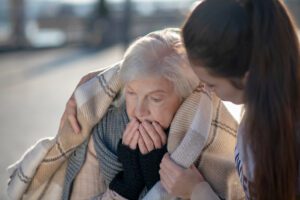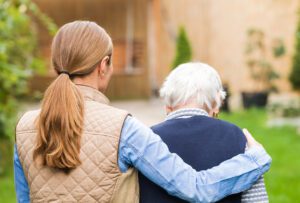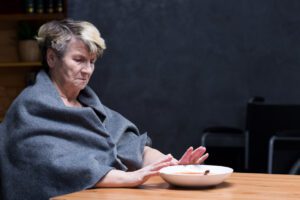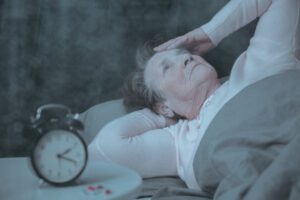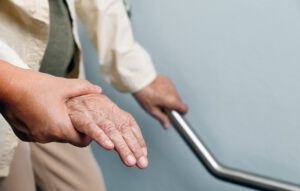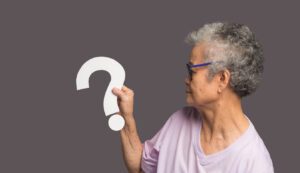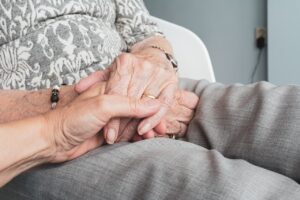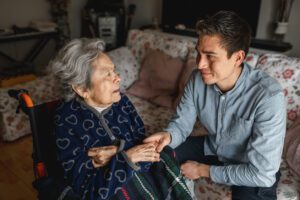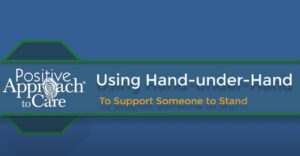Client & Family Topics
How to Respond to Dementia Delusions
Dementia or Alzheimer’s disease can cause many delusions, leading to false accusations and beliefs. While there are indeed some cases of real senior abuse, most cases of accusation are simply not true. That doesn’t make them any less painful, however. It can be very difficult to hear your older adult accuse you of doing horrible…
Read MoreVideo Tips: What to Do When Your Person with Dementia is Looking for Someone Who is No Longer Living
It can be challenging to know what to do when someone with dementia is searching for someone who is no longer alive. When we continue to remind them over and over again that the person has died, it is as if they are experiencing the grief of loss repeatedly. This approach is painful for them.…
Read MoreWhen Someone with Alzheimer’s Says They Want to Go Home
It’s not uncommon for those suffering from Alzheimer’s to repeatedly tell a caregiver that they want to go home. This can be incredibly frustrating when the person is already at home. It’s essential for caregivers to understand that individuals aren’t necessarily asking to be taken somewhere but are instead yearning for comfort. Due to the…
Read More10 Reasons Why Seniors Lose Their Appetite
Many older adults struggle during mealtimes or refuse to eat because they no longer have an appetite. The problem is that in order to stay healthy and active, seniors need to be consuming a sufficient number of nutritious calories every day. The first step is to determine why they may not be eating or if…
Read More5 Tips to Improve Sleep in Dementia
Those suffering from dementia or Alzheimer’s often experience poor sleep, including frequent waking, troubled sleep, or being awake at night. That’s because dementia causes changes in the brain related to sleep. In fact, as many as seven out of 10 people with dementia experience sleep issues, according to the Centers for Medicare and Medicaid Services.…
Read More10 Reasons Why Seniors Walk with a Shuffling Gait
As some people age, they may begin shuffling or dragging their feet when they walk. They may not even notice they’re doing this. Your constant reminders to pick up their feet when they walk may not be enough for them to remember to walk correctly. That’s because they’re not doing it on purpose. Something is…
Read MoreHow to Respond to Repetitive Questions in Dementia
Because Alzheimer’s or other forms of dementia cause problems with short-term memory, those suffering from it tend to repeat the same thing over and over. This can, unfortunately, become a significant source of stress for caregivers, who may be tempted to snap in frustration eventually. It’s important to realize that the older adult isn’t doing…
Read MoreSolutions for Seniors
In February 2024, Cahoon Care’s Allan Parker was interviewed by WATD’s “Solutions for Seniors” host Chris Shea. He discussed the needs facing seniors and their families today and described the services Cahoon Care Associates provides to help meet these pressing needs. Click here to listen to the half-hour interview.
Read MoreDo’s and Don’ts for Visiting Someone with Dementia
Just because people suffer from Alzheimer’s or dementia doesn’t necessarily mean they don’t want visitors. There will be days, of course, where they may prefer to be alone or keep to the routine, but at other times, they will feel more social. For visits from friends or family to be productive, it’s essential to set…
Read MoreVideo Tips: Using Hand-Under-Hand to Support Someone to Stand
The best way to support someone in standing up is to put your hand under his or her hand and guide him or her in doing the usual steps. This is much easier on your body than trying to pull the person up from the front. Here are the steps to follow: Step 1: Feet…
Read More
